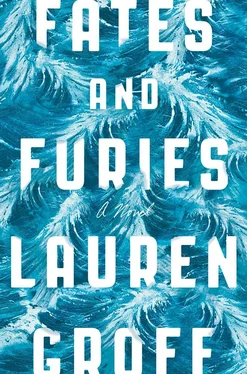“Success is money,” Chollie said. “Duh.”
“Success,” Sallie said, “is finding your greatness, hushpuppies. Lotto, you were born with it. I saw it the moment you came screaming out of Antoinette. Middle of a hurricane. You’re simply not listening to what your greatness is. Gawain told me he always thought you’d be the president of the USA or an astronaut. Something bigger than big. It’s in your stars.”
“Sorry to disappoint you,” Lotto said. “And my stars.”
“Well. You also disappointed our dead father,” Rachel said, laughing.
“To our disappointed dead father,” Lotto said. He raised his glass at his sister and swallowed the bitterness. It wasn’t her fault; she’d never known Gawain, didn’t know what pain she’d summoned.
Mathilde came back in the door, carrying a tray. Glorious in her silver dress, her hair platinum, in a Hitchcock twist: she’d gotten fancy since she’d been promoted six months earlier. Lotto wanted to take her into the bedroom and engage in some vigorous frustration abatement.
Save me, he mouthed, but his wife wasn’t paying attention.
“I’m worried.” Mathilde put the tray down on the counter in the kitchen, turned to them. “I left this up there for Bette this morning, and it’s eleven, and she hasn’t touched it. Has anyone seen her the last few days?”
Silence, the clicking of the heirloom clock Sallie had brought as a carry-on in her duffel. They all looked ceilingward, as if to see beyond the layers of plaster and floorboard and carpet into the cold, dark apartment [silent save for the refrigerator hum, a large cold lump on the bed, the only thing breathing the hungry tabby rubbing against the window].
“M.,” Lotto said. “It’s Christmas. She probably left yesterday for some relative’s place, forgot to tell us. Nobody’s alone on Christmas.”
“Muvva is,” Rachel said. “Muvva’s alone in her dank little beach house, watching the whales with her binocs.”
“Bullhonkey. Your mother had her choice and she chose her agoraphobia over spending Christ’s birthday with her children. Believe me, I know it’s a disease. I live with it every dang day. I don’t know why every year I buy her a ticket. This year she even packed. Put on her jacket, her perfume. Then just sat on the couch. She said she’d rather organize the photo boxes in the spare bathroom. She made her own choice, and she’s a grown woman. We can’t feel bad,” Aunt Sallie said, but her pinched lips belied her words. Lotto felt a rush of relief. Her scratching at him tonight, her picking and prodding, arose from her own guilt.
“I don’t feel bad,” said Rachel, but her face was also drawn.
“I do,” Lotto said quietly. “I haven’t seen my mother for a long time. I feel very bad.”
Chollie heaved a sarcastic sigh. Sallie glared at him. “Well, it’s not like you kids can’t go see her,” Sallie said. “I know she cut you off, but all you have to do is spend five minutes with her and she’ll love you both. And that’s a promise. I can make it happen.”
Lotto opened his mouth, but there was too much to say, and it was all sour toward his mother, un-Christmassy, and so he shut it and swallowed the words back.
Mathilde put a bottle of red wine down hard. “Listen. Antoinette’s never been inside this apartment. She has never met me. She chose to be angry and stay angry. We can’t be sorry for her choices.” Lotto saw her hands trembling; rage, he realized. He loved the rare times she showed how thin her calm surface was; how, beneath, she boiled. A perverse part of Lotto, it’s true, wanted to lock Mathilde and his mother in a room and let them claw it all out. But he wouldn’t do it to Mathilde; she was far too sweet to spend even a minute in his mother’s company without coming out maimed. She turned off the chandelier so the Christmas tree with its lights and glass icicles overcame the room, and he pulled her onto his lap.
“Breathe,” Lotto said softly into his wife’s hair. Rachel blinked in the tree’s gleam.
Sallie had been speaking hard truths, he knew. It had become evident over the past year that he could no longer count on his charm, which had faded; he tested it again and again on coffee baristas and audition gauntlets and people reading in the subway, but beyond the leeway given to any moderately attractive young man, he didn’t have it anymore. People could look away from him these days. For so long, he had thought it was just a switch he could flick. But he had lost it, his mojo, his juju, his radiance. Gone, the easy words. He could not remember a night when he didn’t fall asleep drunk.
And so he opened his mouth and began to sing. “Jingle Bells,” a song he hated, and he was never the world’s best tenor anyway. But what else was there to do but sing in the face of dismay, the image of his fat mother sitting up alone by a potted majestic palm strung in colored bulbs? The others now were joining in, miraculous, all of them save Mathilde, still rigid with anger, though even she was softening, a smile cracking her lips. At last, even she sang.
Sallie watched Lotto, cleaving. Her boy. Heart of her heart. She was clear-eyed, knew that Rachel, being of finer moral stock, kinder, humbler, deserved her affection more than Lotto. But it was for Lotto that Sallie woke praying. These years of distance were hard on her. [ … in a one-horse open sleigh …] It came back to her now, the Christmas before he’d finished college, before Mathilde, when he had met Sallie and Rachel in Boston, where they stayed at a redoubtable ancient hotel and were snowed in under three feet of powder, like being stuck in a dream. Lotto had maneuvered a rendezvous with a girl at another table at dinner, his smoothness so like his mother’s when she was young and lovely that it took Sallie’s breath away. Antoinette, undulating, had for a moment been superimposed on her son. Later, Sallie waited in ambush until midnight, standing at the diamond window at the end of the hallway where their rooms were, the endless snow falling into the Common at her back. [… o’er the fields we go… ] At the other end, in minuscule, three housemaids with their trolleys were laughing, shushing one another. At last, her boy’s door opened and he emerged, bare but for a pair of running shorts. Such a beautiful long back he had, his mother’s, at least when she was thin. There was a towel around his neck; he was going up to the pool. The sin he intended to enact so painfully obvious that Sallie’s cheeks burned in imagining the girl’s buttocks gridded with tile marks, Lotto’s knees scabby in the morning. Where did he learn such confidence, she thought, as he became smaller, going toward the housemaids. He said something and all three pealed, and one gave him a little flick with a cloth, and another sent a slow glitter, chocolates, at his chest. [… laughing all the way, ha ha ha! ] He caught them. His laugh rumbled back to Sallie. How ordinary he was becoming, she’d thought. He was turning banal. If he wasn’t careful, some sweet girl would glue herself to him, Sallie saw, and Lotto would drift into marriage, a job as some high-paid menial, a family, Christmas cards, a beach house, middle-aged flab, grandchildren, too much money, boredom, death. He’d be faithful and conservative in old age, blind to his privilege. When Sallie stopped crying, she found herself alone, the cold draft of the window at her neck, and on both sides the rows of doors went on and on, diminishing to nothing at the end. [… what fun it is to ride and sing a sleighing song tonight, oh! ] But glories! Mathilde came; and though she appeared to be the selfsame sweet girl Sallie had been afraid of, she was not. Sallie saw the flint in her. Mathilde could save Lotto from his own laziness, Sallie had thought, but here they were, years later, and he was still ordinary. The chorus caught in her throat.
Читать дальше












